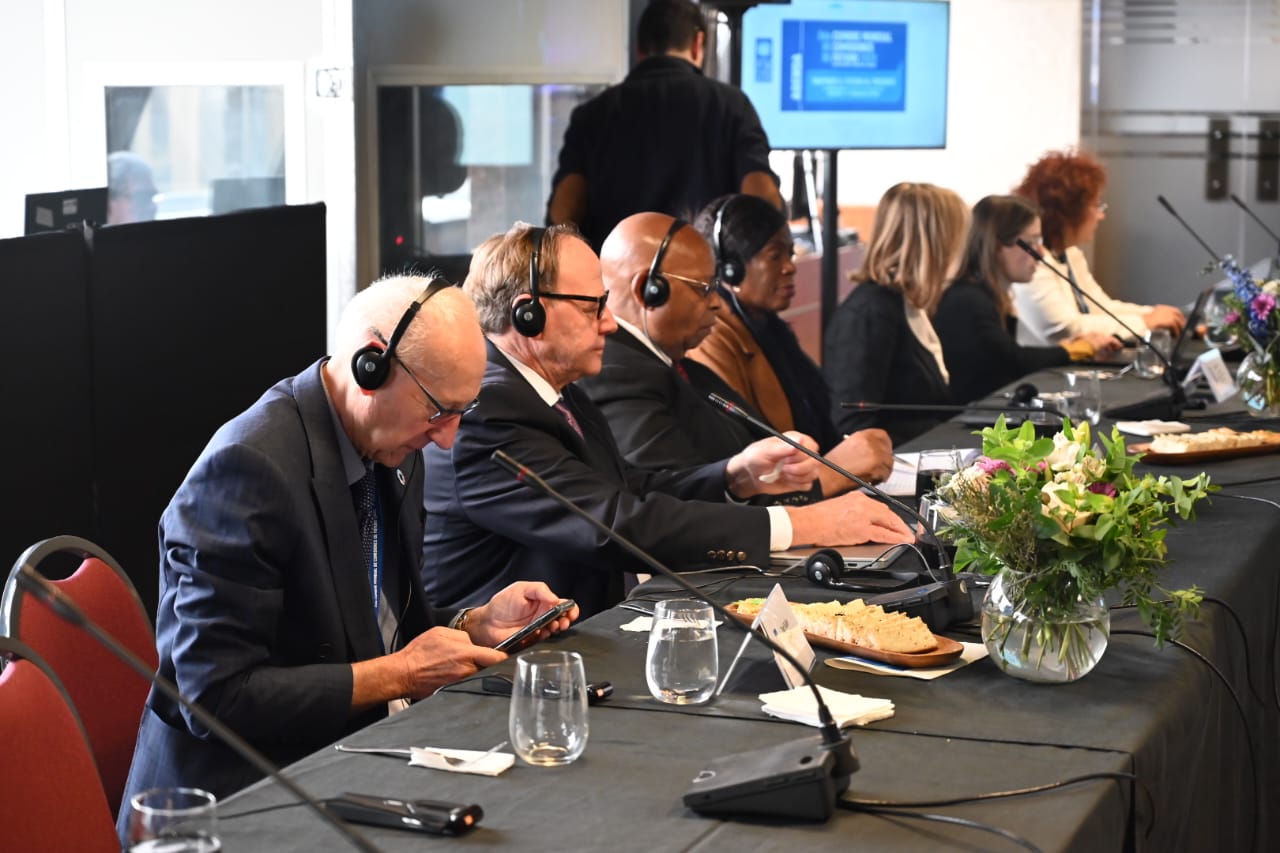|
Getting your Trinity Audio player ready...
|
Speaker of Parliament Hon Advocate J.F.N Mudenda is in Montevideo, Uruguay, where he is attending the 2nd World Summit of the Committees of the Future 2023. Enroute to Montevideo, Speaker Mudenda was met by His Excellency Ambassador Meshack Kitchen in Sao Paulo, Brazil, Zimbabwe’s Ambassador to the South American bloc specifically Brazil, Argentina, Bolivia, Chile, Colombia, Ecuador, Paraguay, Peru, Uruguay, and Venezuela. Subsequently, the Speaker received a brief from the Ambassador covering various aspects of the host nation including its preparedness to host the current Summit.
The Summit is set to continue on the trajectory started in Finland in 2022 on the occasion of the First World Summit of the Committees of the Future held in Helsinki. Participating parliamentarians recognized the fundamental importance of incorporating the Future paradigm in the present-day use of AI. Accordingly, they reached a consensus on the need for sustained inter-parliamentary dialogue in order to address emerging global common AI positive impacts and attendant challenges.
The 2nd World Summit of the Committees of the Future 2023 is running under the overarching theme- BRINGING THE FUTURE TO THE PRESENT: THE DEMOCRACY OF THE FUTURE, ARTIFICIAL INTELLIGENCE (AI) AND PARLIAMENTS. The theme offers an opportunity to reflect on experiences and exchange views on the challenges and opportunities in embracing AI to democracy equity, decision-making, and responsible parliamentary digital processes. The outcome of this Summit is expected to come up with recommendations on how best to harness AI for the positive good of humankind. In attendance at the Summit are 160 delegates representing the five Inter-Parliamentary Union (IPU) Geo-political groups, namely, Africa, Arab, Eurasia, Grulac, Asia Pacific, and Twelve plus 2.
As the use of Artificial Intelligence (AI) in parliamentary processes becomes increasingly prevalent, it is necessary to establish ethical and operational guidelines that ensure accountability, transparency, and human autonomy, while promoting sustainable development goals and protecting privacy, security, and diversity. While AI has made significant advancements in recent years, it has raised questions about its potential to replace human being parliamentarians.
AI can analyze complex legislative issues, identify patterns, and make predictions based on historical data. This speed allows for faster decision-making in expediting parliamentary processes. However, human parliamentarians bring experience, knowledge, and the ability to consider ethical and moral aspects that AI may struggle with. They also provide a diverse range of perspectives and values, fostering debate and ensuring multiple viewpoints are considered.
Regarding these Parliamentary processes, the complex relationship between AI and human autonomy needs to be taken into account. Human autonomy is already threatened by existing technologies. The use of AI tools could enhance or decrease human autonomy, depending on how they are designed and which domains they are built to cover. The human element is an essential aspect of democracy. Human parliamentarians possess empathy, emotional intelligence, and the ability to connect with constituencies on a personal level. These qualities enable them to understand the needs and concerns of the people they represent, making them more relatable and responsive. AI, while efficient, lacks the ability to empathize or understand complex human emotions, limiting its capacity to fully represent the interests of a diverse population. It is thus imperative to promote human autonomy and decision-making, including ensuring that parliamentary AI is used to supplement human capabilities rather than replace them.
However, Artificial Intelligence (AI) has the potential to revolutionize parliamentary processes by improving efficiency and objectivity. Striking a balance between AI and human parliamentarians is essential to preserve accountability, and democratic values and achieve effective and inclusive governance.
The Summit was officially opened on 25th September 2023 by the President of Uruguay, His Excellency, Mr Luis Lacalle Pou. The other high-ranking dignitaries in attendance included Ms. Beatriz Argimón, Vice President of the Republic and President of the Senate of Uruguay, Mr. Sebastián Andújar Alvarez, President of the House of Representatives of Uruguay, and Mr. Duarte Pacheco, President of the IPU. In his opening remarks, President Pou underlined the centrality of AI and the metamorphosis of science in various sectors of digital technologies. The State President challenged Parliamentarians to take a positive approach towards AI usage as well as reinforcing that the AI evolution, like water, will always find a way of navigating around rocky and mountainous terrains of human existence.
In her welcome remarks to Summit participants, Rt Hon. Argimon noted that the Summit provides a quintessential platform to introspect and exchange views on AI applications. Additionally, she shared the remarkable strides taken by Uruguay in embracing AI to the extent that she is convinced that as the country prepares for its elections in 2024, all political parties will embrace AI usage in their manifestos during the campaign trail.
The President of the House of Representatives, Mr. Sebastián Andújar Alvarez, focussed on the positive transformation of AI in socio-economic development, particularly in the areas of health, education, communication technologies and climate change future impacts. However, he also noted areas of negative concerns such as infringement of human rights, tempered transparency, accountability, creation of inequalities, intrusion of privacy, and lack of empathy where AI is applied. Accordingly, the House of Representatives President welcomed the opportunity to exchange views on this critical Summit regarding the use of AI currently and in the future.
On the other hand, Hon. Pacheco, the IPU President, underpinned the need for active participation of Parliaments in conversations around the Future given their hallowed legislative, representation and oversight mandate of being the institution of the voiceless electorate who cannot be privileged to be in the Parliaments.
The Uruguay Chairman of the Committees of the Future noted that AI should benefit humanity. In the same vein, there is need to renew trust and protect human rights and freedom as the global community embraces changes associated with AI.
Speaker Mudenda is expected to make interventions during the two-day Summit, ensconcing the extent to which the Parliament of Zimbabwe is embracing the trailblazing age of AI, as well as proffering solutions for anticipated challenges.






